Overview
The article titled "10 Key Insights on Mental Health VA Ratings for Veterans" addresses the challenges veterans face in understanding the evaluation of their mental health conditions for VA ratings. We understand that this process can be overwhelming, but knowing the VA's rating criteria and how to navigate the application process can make a significant difference. Engaging effectively with this process—such as utilizing AI tools, preparing for C&P exams, and gathering comprehensive evidence—can enhance your chances of receiving the benefits you deserve. Remember, you are not alone in this journey, and we're here to help you every step of the way.
Introduction
Navigating the complexities of mental health VA ratings can feel overwhelming for many veterans. We understand that as you seek the benefits you have rightfully earned, the process may seem daunting. This article delves into critical insights designed to empower former service members like you to better understand the evaluation process. From the intricacies of the rating system to the essential documentation needed for successful claims, we aim to provide clarity.
However, with proposed changes on the horizon and the potential for denial looming, it's common to feel uncertain. How can you ensure your voice is heard and your needs are met? Exploring these ten key insights will not only provide clarity but also actionable strategies for you as you strive to secure your mental health benefits. Remember, you are not alone in this journey; we're here to help.
Turnout: Streamlining VA Mental Health Rating Applications for Veterans
We understand that navigating the application process for mental health VA rating can be challenging for former service members. That's why Turnout is changing the game by harnessing the power of AI technology. With Jake, the AI case quarterback, experienced individuals receive timely updates and proactive follow-ups, ensuring their applications are processed efficiently.
This contemporary method significantly reduces the bureaucratic barriers that often impede service members, enabling simpler access to the benefits they have earned. For instance, the VA has recently reported a 37% reduction in claims backlog, showcasing how effective integrating AI into the claims process can be.
Veterans like John, who actively engage with their healthcare providers and maintain updated medical records, experience smoother claims processing. AI systems can quickly analyze comprehensive documentation, making a world of difference. In contrast, individuals like Mike, who do not provide current evidence, face ongoing challenges, leading to repeated claim denials.
This emphasizes the importance of involvement in the claims process. We encourage you to work together with advocates and utilize AI tools, as those who do are more likely to achieve positive results. Remember, you are not alone in this journey, and we’re here to help you every step of the way.
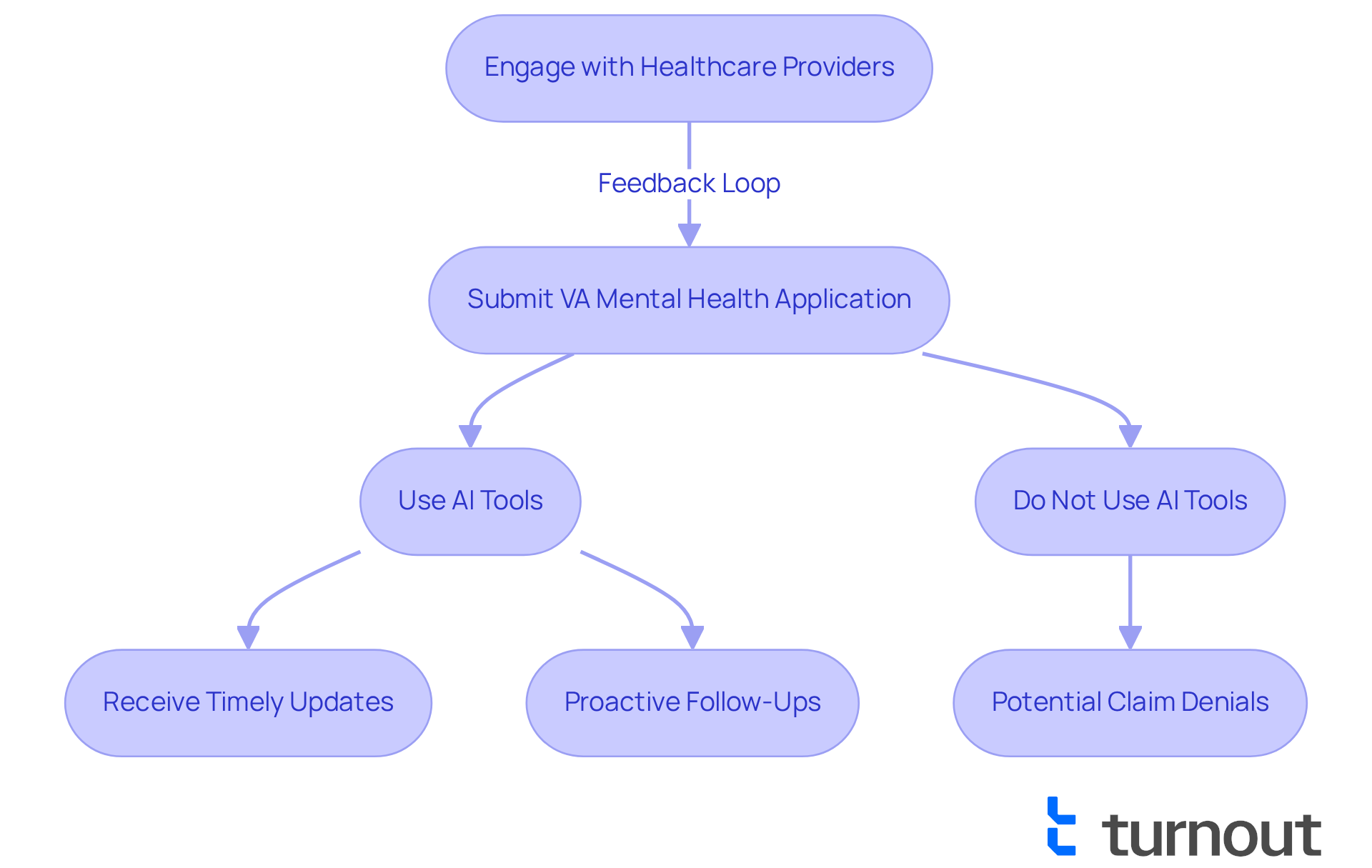
General Rating Formula: How the VA Evaluates Mental Health Conditions
Navigating the complexities of psychological evaluations can be challenging, and we understand that many former service members face significant hurdles in this process. The VA employs a General Assessment Formula to evaluate psychological conditions, which is crucial for determining the mental health VA rating, assigning scores from 0% to 100% based on symptom intensity and their impact on daily functioning. For example, a score of 10% reflects mild symptoms that do not greatly interfere with daily life, while a score of 100% indicates complete impairment affecting all aspects of an individual’s life.
In 2025, the VA plans to introduce a new evaluation system that will utilize a five-domain model to assess mental health conditions. This model will focus on essential areas such as:
- Cognition
- Interpersonal interactions
- Task completion
- Environment navigation
- Self-care
Understanding this new system is crucial, as it directly influences your compensation, benefits, and mental health VA rating.
Recent statistics show that many former service members receive assessments of 30% or above, indicating moderate to severe disabilities that can affect their ability to work and maintain relationships. We encourage you to document your symptoms across all five domains, as this can significantly strengthen your claims. Remember, you are not alone in this journey; grasping this formula and the upcoming adjustments can empower you to navigate the claim process more effectively. We're here to help you secure the benefits you deserve.
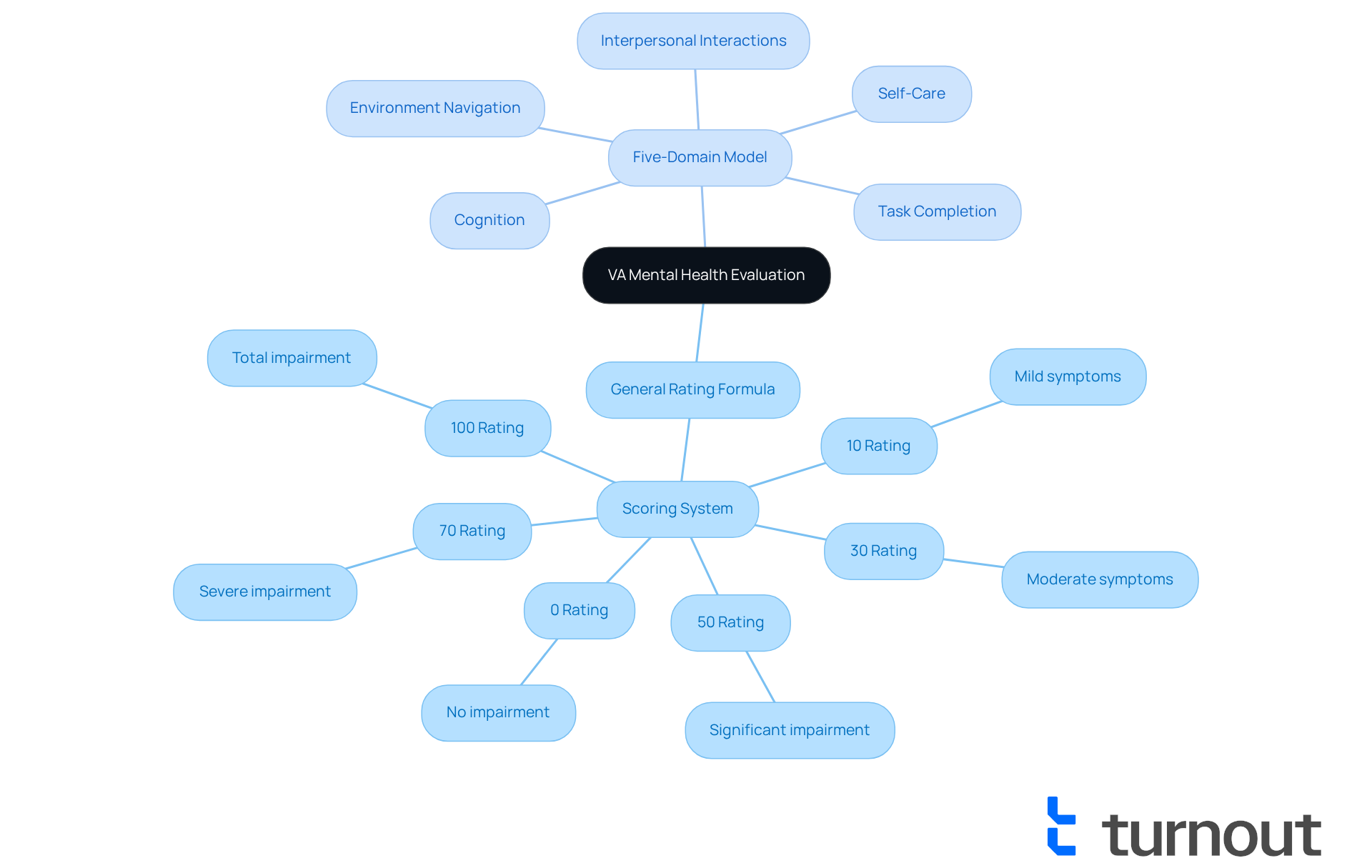
Mental Health Ratings Breakdown: Key Criteria for 0% to 100% Ratings
The VA allocates mental health VA rating evaluations based on specific criteria that reflect the intensity of symptoms and their impact on daily functioning. Understanding these evaluations is vital for veterans as they navigate the claims process related to their mental health VA rating. Here’s a breakdown of the rating percentages:
- 0%: No symptoms or minimal symptoms that do not interfere with daily life.
- 10%: Mild symptoms that may require occasional treatment, affecting work efficiency only during significant stress.
- 30%: Moderate symptoms that lead to occasional decreases in social and occupational functioning, such as depressed mood and chronic sleep impairment.
- 50%: Severe symptoms that significantly impair daily activities, including flattened affect and panic attacks occurring more than once a week.
- 70%: Major symptoms resulting in severe impairment in most areas of life, including suicidal ideation and near-continuous panic or depression.
- 100%: Total impairment, indicating an inability to function in any capacity, with severe symptoms like delusions and an inability to perform daily activities.
Veterans often express their psychological experiences by categorizing symptoms within these classifications, which can strengthen their claims for a mental health VA rating. As one veteran shared, 'Understanding the criteria helped me express my struggles more clearly, making it easier to advocate for the support I need.' This clarity can significantly influence the outcome of their claims related to mental health VA rating, ensuring they receive the compensation that accurately reflects their level of impairment.
It's important to recognize that proposed changes to the VA psychological evaluations may eliminate the 0% mental health VA rating and ensure a minimum 10% rating for all service-related psychological conditions. Moreover, data indicate that 80% of former service members feel undervalued by the VA, underscoring the importance of articulating psychological experiences in claims. Collecting thorough medical data and considering psychological assessments are essential steps for former service members to enhance their claims process. Remember, you are not alone in this journey, and we’re here to help you every step of the way.
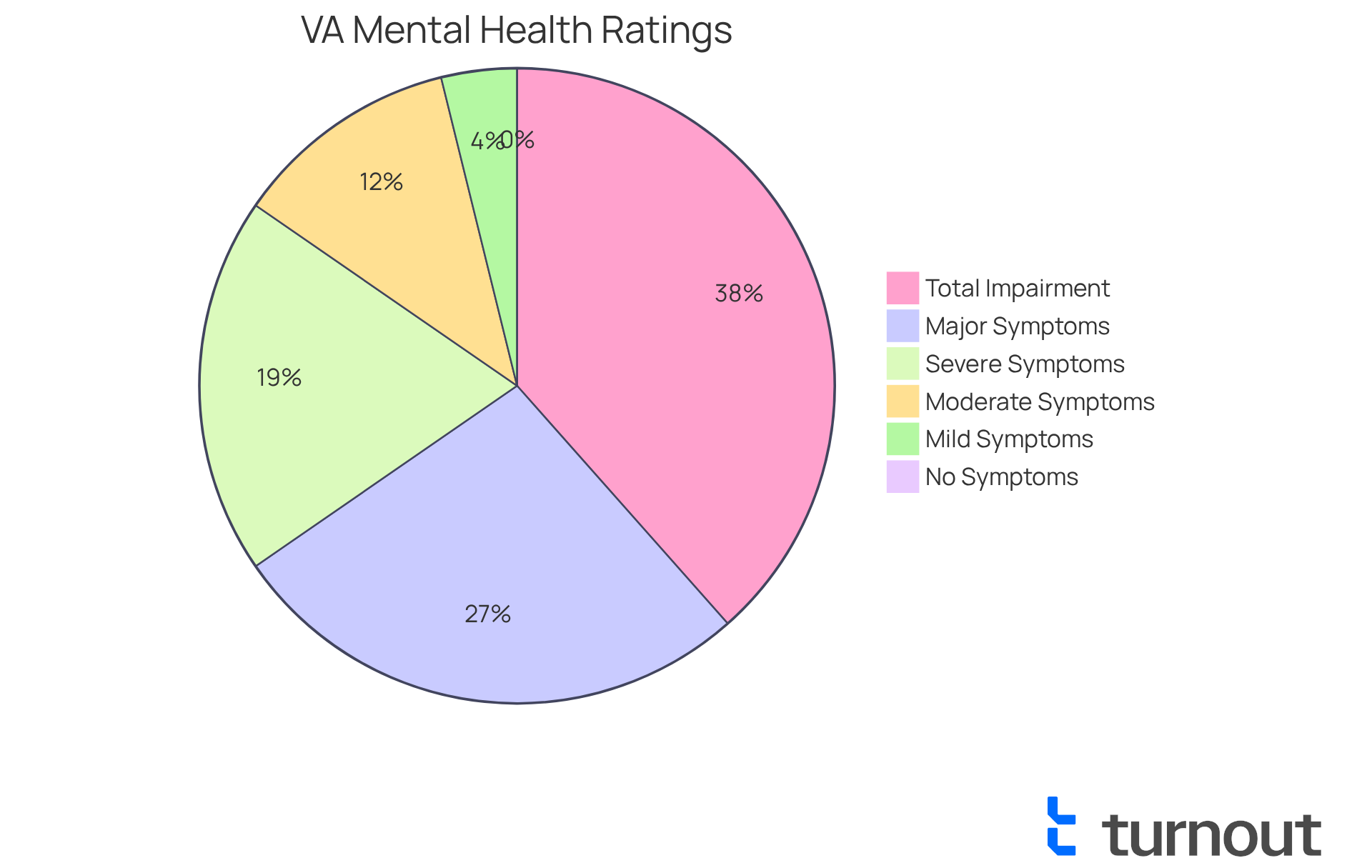
C&P Exams: Essential Evaluations for VA Mental Health Ratings
C&P assessments are vital in the VA's process for establishing psychological condition classifications. We understand that navigating these assessments can be challenging. During these evaluations, qualified professionals assess former service members' mental health conditions and their impact on daily life. Honesty and thoroughness in responses are crucial, as the outcomes significantly influence disability ratings.
Preparation is essential. We encourage individuals to gather relevant medical records and be ready to discuss how their symptoms affect daily functioning, relationships, and work. Keeping a symptom diary can be particularly helpful; it allows you to track the frequency and severity of your conditions, providing valuable context during the exam.
As of 2025, average wait times for C&P exams have improved due to increased outsourcing. Previously, the VA conducted only about 15% of these exams by November 2020 due to a backlog. However, it's common to have concerns about the quality of care provided by private contractors. Lawmakers have raised issues regarding potential errors and the overall effectiveness of these outsourced services.
Ultimately, these exams play a pivotal role in the mental health VA rating process for VA claims. The findings often carry more weight than those from your treating healthcare providers. By recognizing the significance of C&P exams and preparing effectively—such as collecting supplementary evidence like independent medical assessments and buddy statements—you can enhance your chances of obtaining the benefits you deserve. Remember, you are not alone in this journey; we’re here to help you every step of the way.
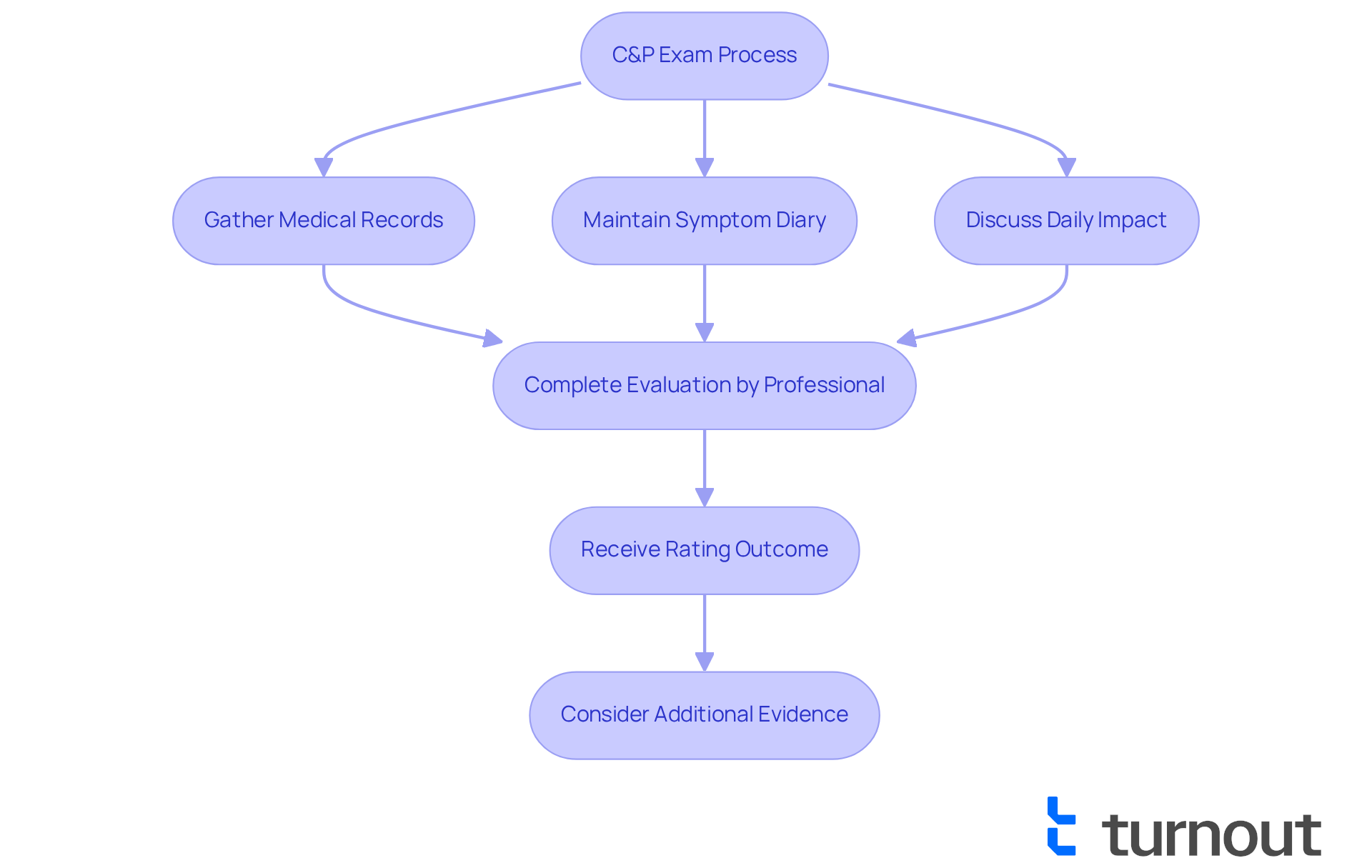
Lay Evidence: Strengthening Your VA Mental Health Claim
Lay evidence includes statements from individuals who can provide valuable insight into a service member's mental health condition and its impacts on their daily life, which can influence the mental health VA rating. Friends, family members, or colleagues who have observed the individual's challenges can offer this evidence. These testimonies are crucial in providing context and supporting the individual's claims about their mental health VA rating, especially when medical records may not fully reflect the severity of their condition.
Personal accounts can detail how an individual's mental health struggles affect their relationships, work performance, and overall quality of life. Symptoms such as pain, weakness, and behavioral changes can be effectively reported through these statements. Veterans are encouraged to collect these statements, as they can significantly strengthen their applications for mental health VA rating and improve the likelihood of a favorable outcome.
Many former service members, like Chip P., have expressed gratitude for the influence of lay statements in their claims process. They note that these statements provided essential context that medical documentation alone could not convey. By incorporating detailed insights from individuals familiar with them, former service members can craft a more engaging story that aligns with the mental health VA rating assessment standards.
It's important that lay statements are written in the witness's own words, include specific details such as dates and events, and maintain consistency to avoid questions of credibility from the VA. Additionally, establishing a clear connection between the medical condition and military service is essential for a successful claim. Remember, you are not alone in this journey, and we’re here to help you navigate it.
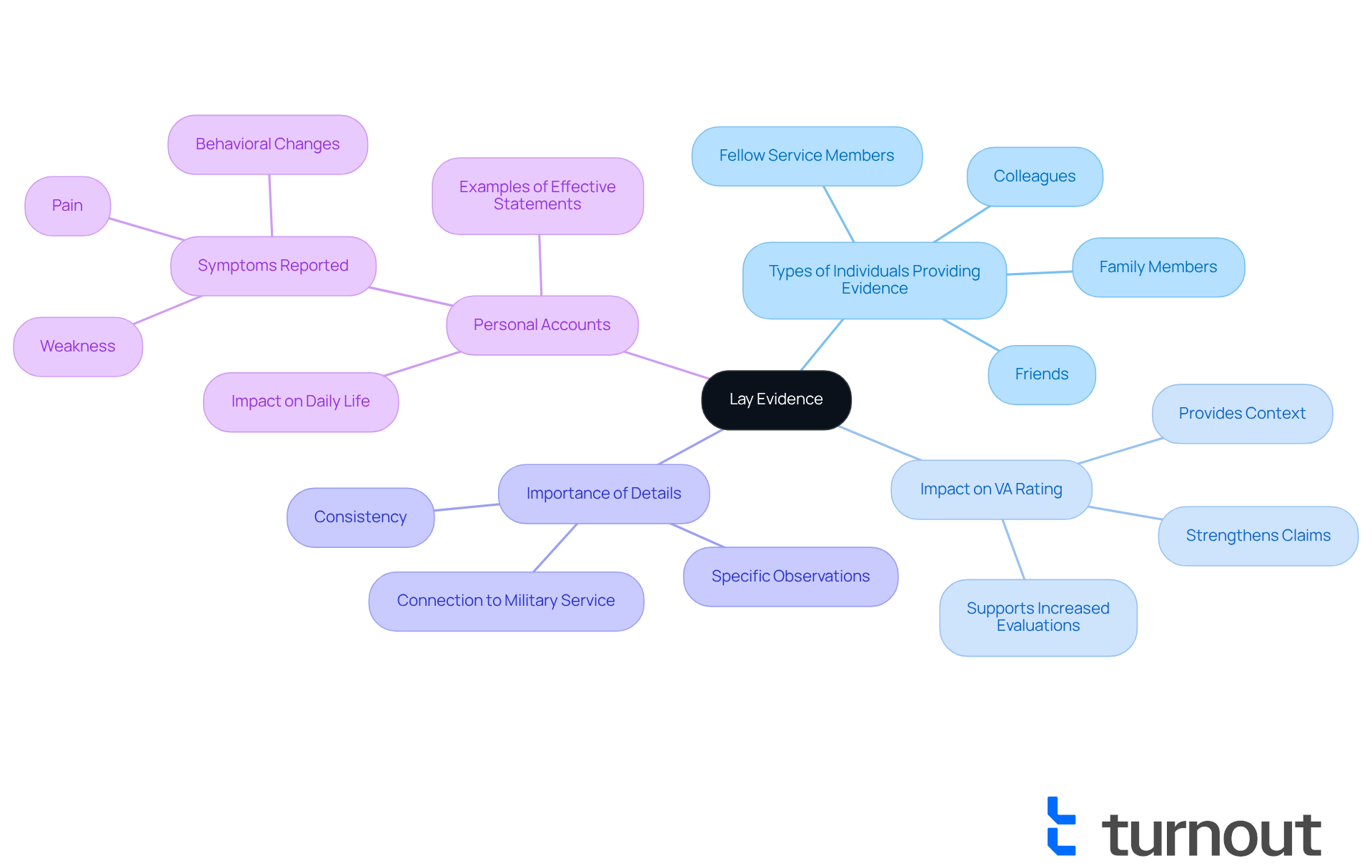
Private Medical Records: Supporting Your VA Mental Health Rating
Confidential medical records play a vital role in strengthening a VA psychological claim. These documents provide essential evidence of ongoing treatment, formal diagnoses, and symptom severity—all crucial for establishing the legitimacy of a claim. We understand that navigating this process can be challenging, so veterans should actively seek and submit relevant medical documentation from private healthcare providers. This step can significantly improve their chances of approval.
To make this process easier, it is important to complete the necessary VA forms, such as VA Form 21-4142 and VA Form 21-4142a, which authorize the release of these records to the VA. Many veterans have successfully leveraged private medical documentation to secure higher mental health VA ratings. Strong medical evidence not only supports an individual's statements during the Compensation and Pension (C&P) exam but also provides a comprehensive view of their condition.
As Dwayne Edwards from VMHA emphasizes, "Medical evidence secures VA psychological claims, and we are here to assist you in obtaining it." This highlights the importance of thorough documentation in navigating the complexities of the VA claims process. By ensuring that all relevant medical records are submitted, you can significantly enhance your chances of obtaining the benefits you deserve. Remember, you are not alone in this journey—we're here to help you every step of the way.
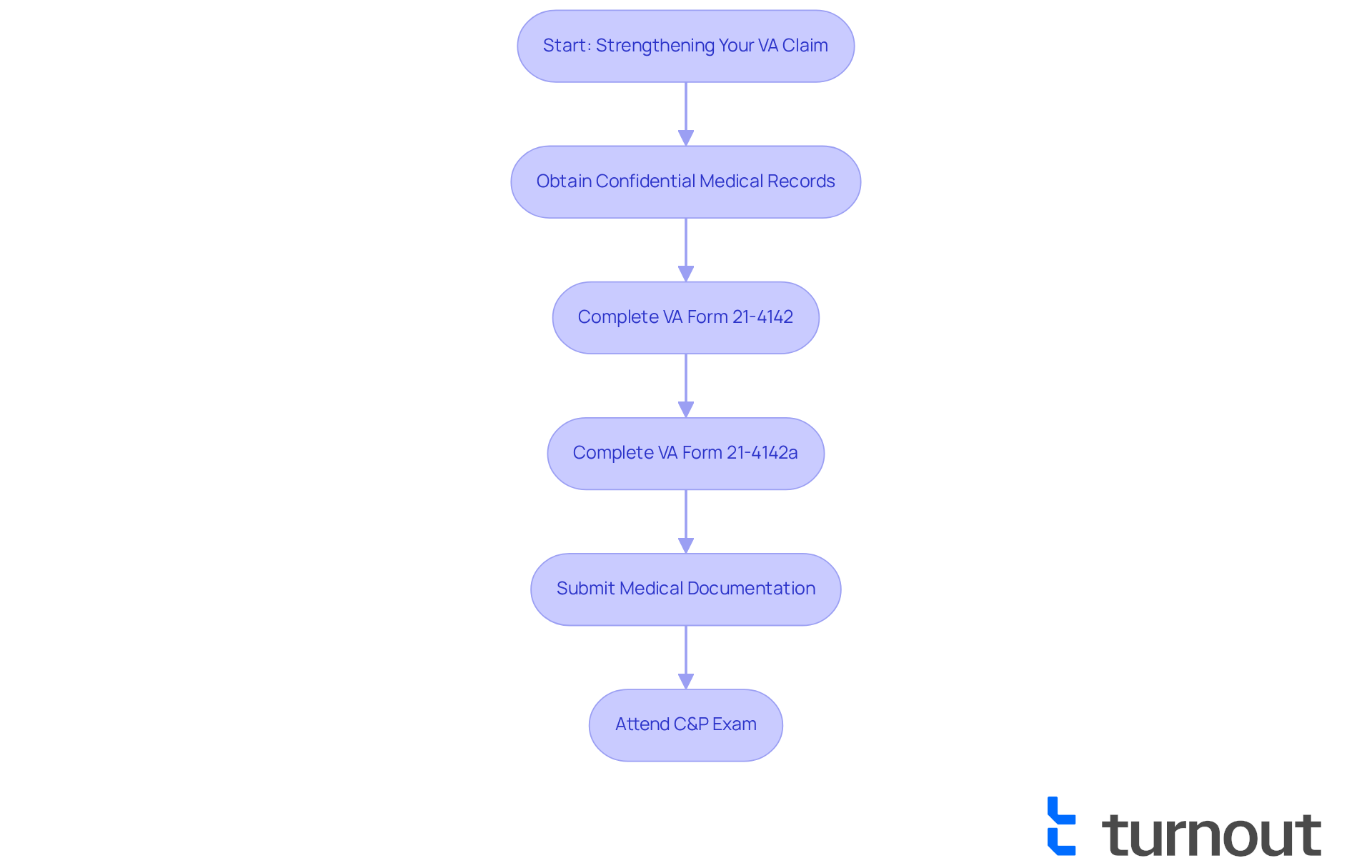
Multiple Conditions: Navigating VA Ratings for Coexisting Mental Health Issues
Veterans facing mental health challenges encounter unique obstacles during the mental health VA rating evaluation process. We understand that this journey can be daunting. The VA employs the concept of anti-pyramiding, which prevents former service members from receiving separate evaluations for overlapping symptoms. Instead, a single evaluation is assigned that reflects the overall severity of all conditions. For instance, if a dedicated service member is dealing with both bipolar disorder and PTSD, the VA may allocate a combined rating based on the most significant impairment, rather than assessing each condition individually.
To ensure a fair evaluation, it’s crucial for veterans to meticulously document how each condition impacts their daily life. This involves outlining specific symptoms, triggers, and limitations related to each psychological condition. Clear medical evidence is essential to differentiate between symptoms linked to different conditions, especially when issues like Traumatic Brain Injury (TBI) complicate the attribution of symptoms.
Many veterans have shared their experiences regarding the challenges posed by coexisting psychological issues. It’s common to feel frustrated with the VA's evaluation system, which often results in a single score that may not fully represent the severity of individual conditions. Understanding the anti-pyramiding rule and gathering the right evidence can significantly influence the outcome of claims, allowing for a more accurate representation of the mental health VA rating.
As the VA prepares to implement changes to the assessment system by fall or winter 2025, it’s important for former service members to stay informed about how these updates may affect their evaluations. The overall assessment will range from 10% to 100%, depending on impacted areas and intensity. This highlights the importance of comprehensive documentation and a clear understanding of the assessment process. Remember, you are not alone in this journey; we’re here to help you navigate these complexities.
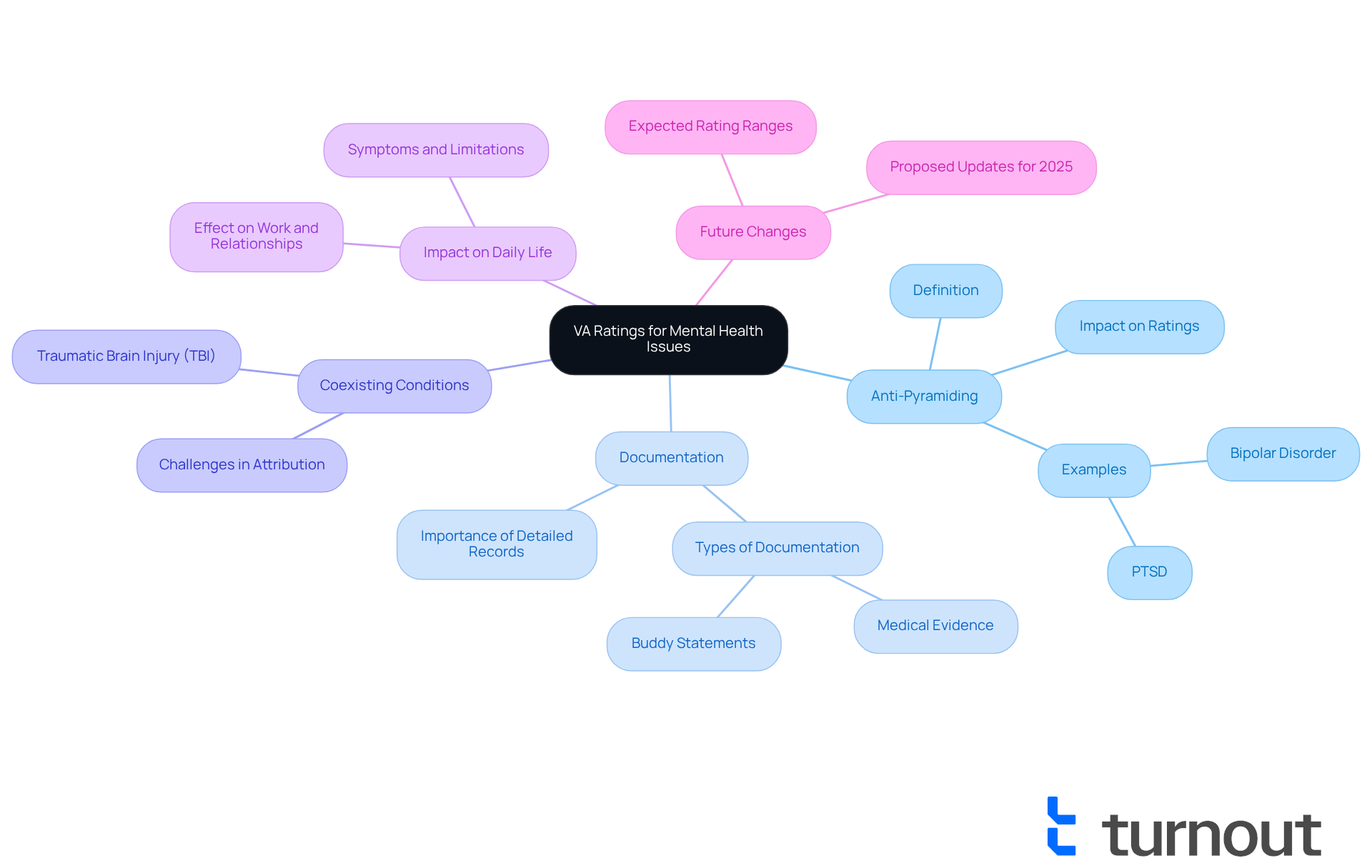
Appealing Denied Ratings: Steps to Take for VA Mental Health Claims
When a former service member's application for a mental health VA rating is rejected, contesting the ruling is an essential entitlement. We understand that this can be a frustrating experience. The first step involves carefully reviewing the denial letter to grasp the specific reasons behind the decision. Veterans should then focus on gathering additional evidence to strengthen their case. This may include:
- Updated medical records
- Personal statements from fellow service members
- Any relevant documentation that connects their mental health condition to their military service to support their mental health VA rating
Filing a Notice of Disagreement (NOD) is the next crucial step in the appeals process. This formal document indicates your intention to contest the denial. It's common to feel overwhelmed, but remember, you are not alone in this journey. Depending on your situation, you may also consider:
- Requesting a hearing
- Pursuing a higher-level review to ensure your case receives thorough consideration
Additionally, filing a Supplemental Claim allows you to submit new and relevant evidence for reconsideration.
Persistence and meticulous documentation are vital components of a successful appeal for obtaining a mental health VA rating. Many former service members have effectively reversed initial rejections by presenting thorough evidence that explicitly details their symptoms and the effects on their everyday lives. One experienced individual shared that collecting comprehensive medical documentation and personal testimonies greatly enhanced their likelihood of obtaining benefits.
Statistics show that thousands of former service members successfully navigate the appellate process each year, often resulting in positive outcomes. Engaging with resources like Veterans Service Organizations (VSOs) can offer cost-free guidance for straightforward cases. This support can further enhance your ability to advocate for your rights and benefits. By understanding the VA's reasoning and preparing a strong appeal, you can effectively contest unjust decisions and strive to obtain the benefits you deserve.
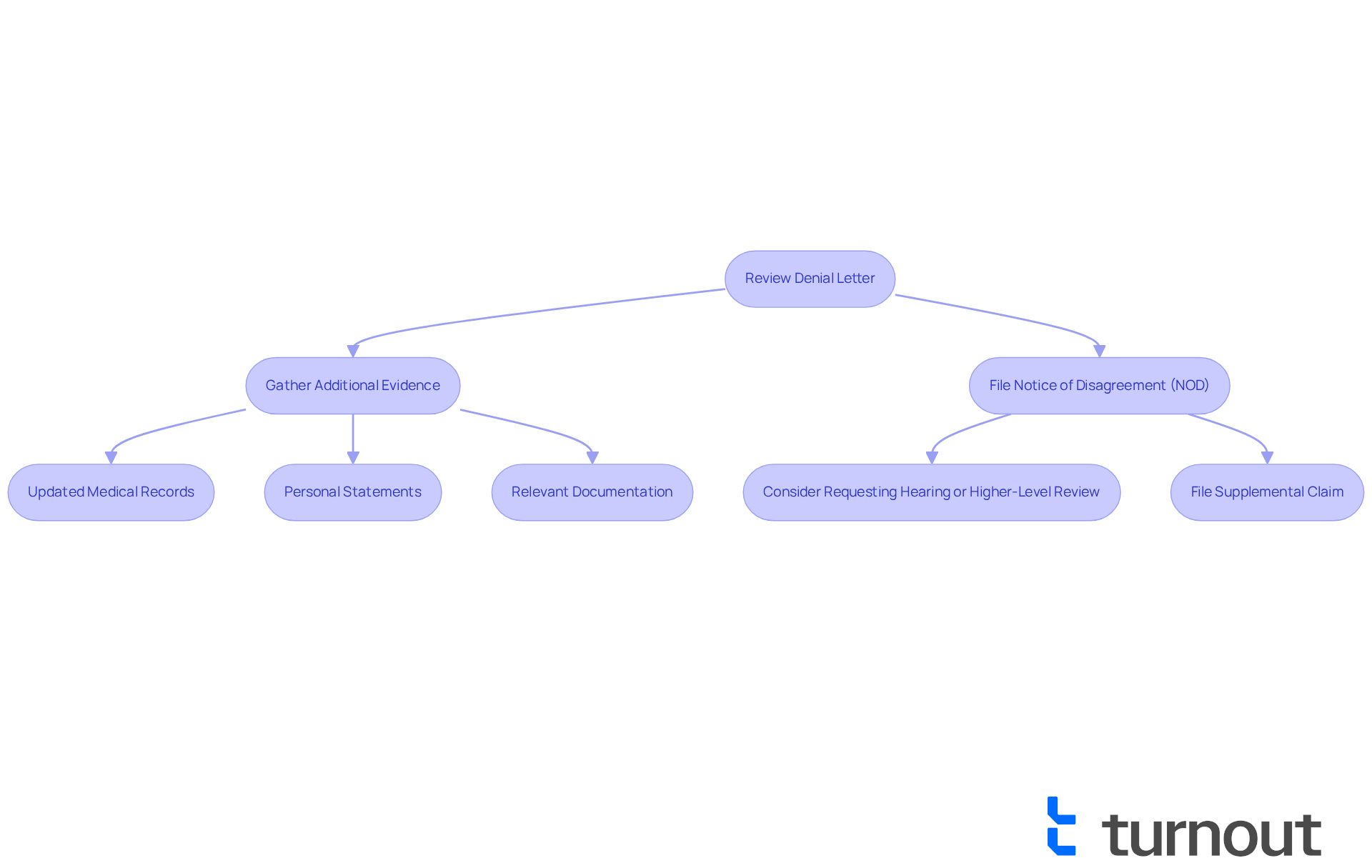
TDIU: Understanding Total Disability for Mental Health Conditions
Total Disability Individual Unemployability (TDIU) offers a lifeline for service members, allowing them to receive compensation equivalent to a 100% disability rating, even if their overall rating falls below that threshold. It's essential for former service members to demonstrate that their service-related psychological conditions significantly hinder their ability to maintain meaningful employment, particularly when considering their mental health VA rating. This provision is especially crucial for those whose mental health VA rating challenges greatly affect their work capabilities. Comprehensive documentation detailing the impact of these conditions on employment is vital for a successful claim.
Many former service members have successfully qualified for TDIU due to mental health VA rating associated with conditions like PTSD, Major Depressive Disorder, and Generalized Anxiety Disorder. One individual shared, "After years of struggling with a 60% disability rating, I was able to secure a 100% rating with backpay, significantly improving my financial situation." This underscores the importance of persistence and the right support in navigating the claims process.
Statistics reveal that approximately one in three former service members experiences depression, a rate significantly higher than that of the general population. This highlights the urgent need for effective advocacy and support systems for those facing psychological challenges. The impact of TDIU on the lives of former service members can be profound, providing not only financial assistance but also access to essential healthcare services and educational benefits for their dependents.
Veterans pursuing TDIU should focus on gathering strong evidence, such as:
- Medical records
- Employment history
- Personal testimonies that illustrate how their psychological conditions affect their daily lives and work capabilities
This is vital for their mental health VA rating. It's also important to note that former service members can receive both TDIU and Social Security Disability Insurance (SSDI) simultaneously, offering additional financial support. By taking these steps, they can improve their chances of obtaining the benefits they truly deserve.
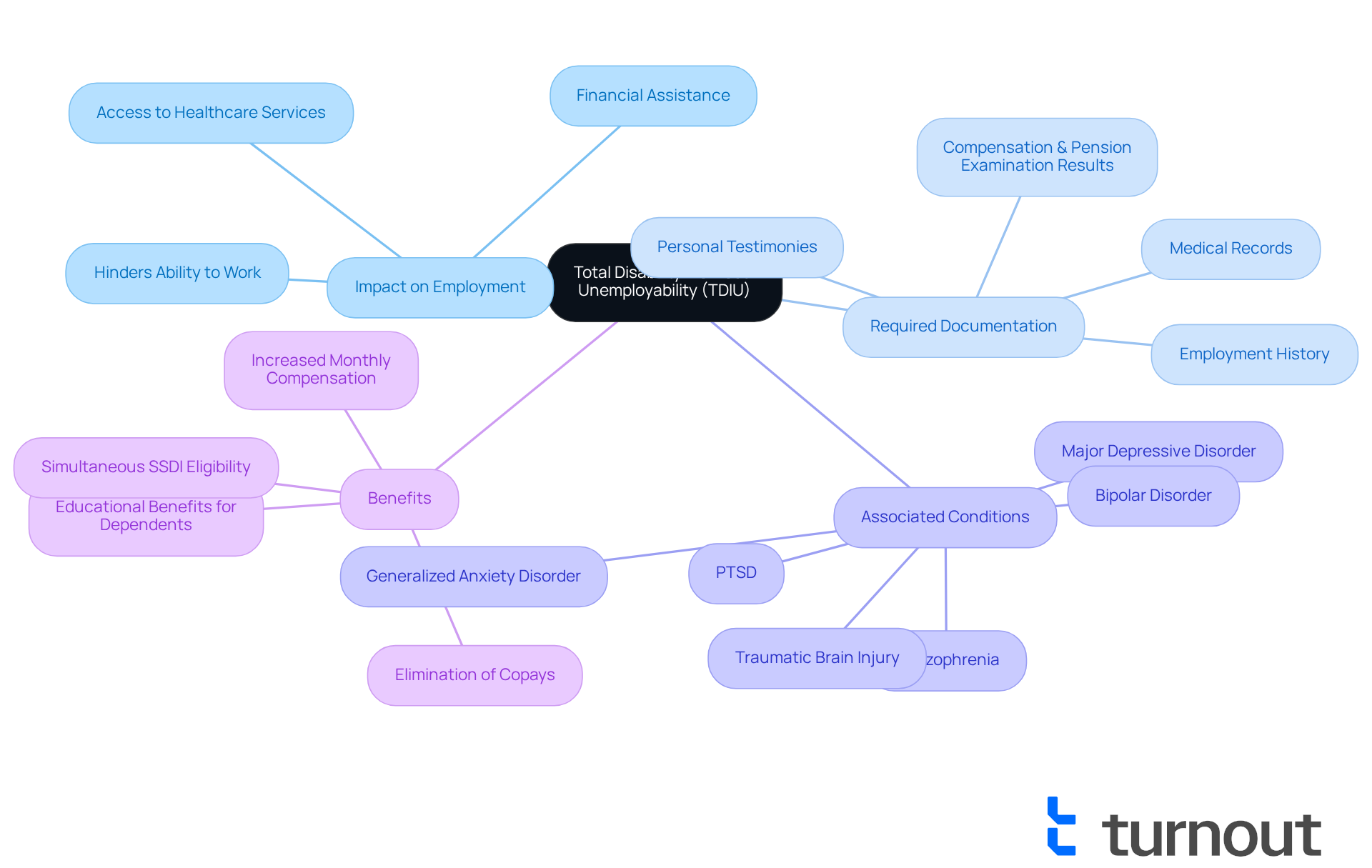
Compensation Amounts: What to Expect from Your VA Mental Health Rating
Understanding compensation figures for VA psychological assessments is crucial for former service members as they navigate their mental health VA rating and financial strategies. As of 2025, a 10% rating translates to about $175 per month, while a 100% rating can exceed $3,800 monthly. This significant disparity underscores the importance of grasping these figures as you evaluate the financial impact of your mental health VA rating.
It's common to feel overwhelmed by these numbers. Regularly checking the mental health VA rating for updates is essential, as these amounts can change. Keeping informed can greatly influence your budgeting and financial strategies.
Financial advisors emphasize the importance of incorporating mental health VA rating into your overall financial planning. By doing so, you can ensure stability and support throughout your recovery journey. Remember, you're not alone in this. We're here to help you navigate these challenges and build a brighter future.
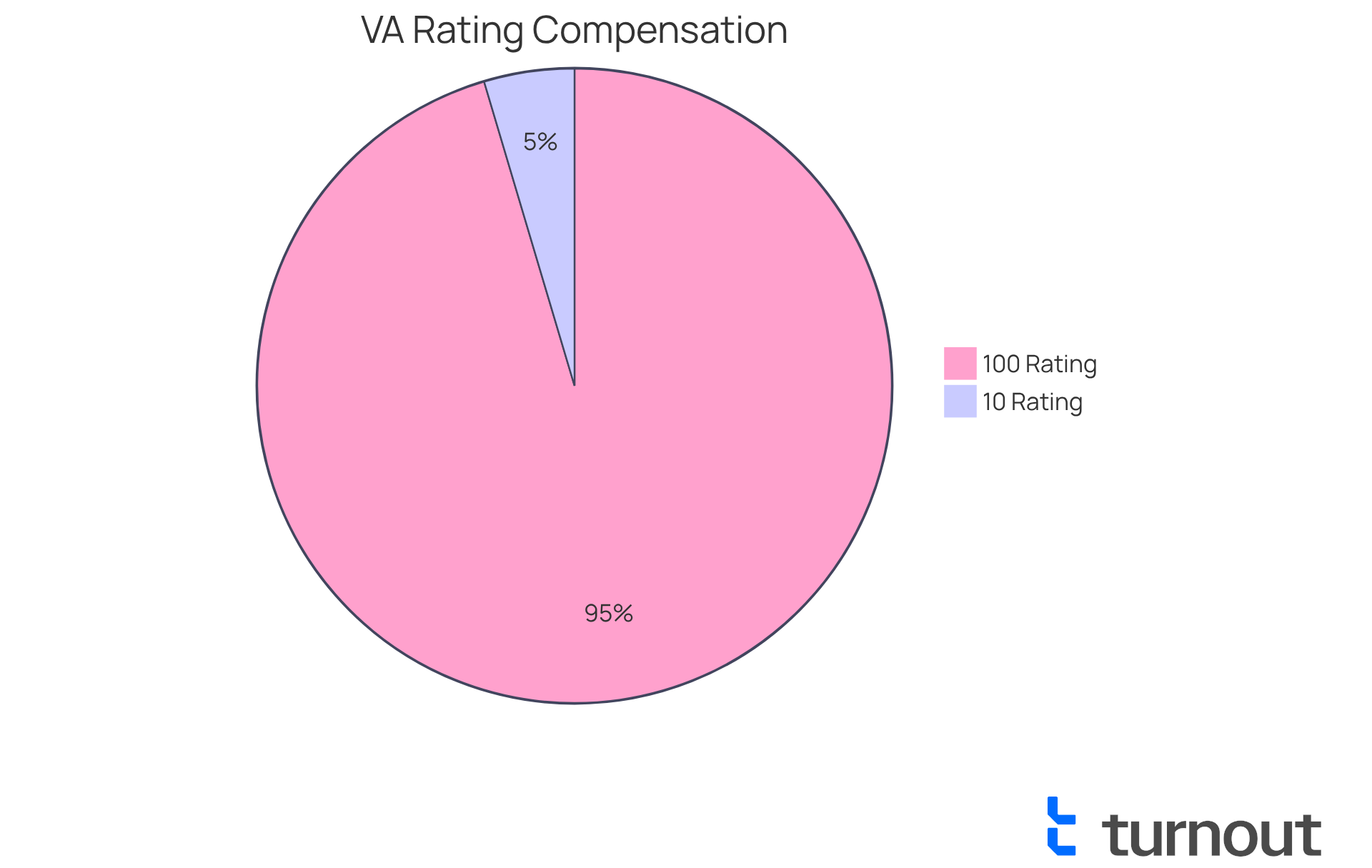
Conclusion
Navigating the complexities of mental health VA ratings can feel overwhelming for veterans seeking the benefits they truly deserve. We understand that this journey is not easy. This article has explored essential insights, from understanding the evaluation process and criteria to the significance of lay evidence and C&P exams. By leveraging modern tools like AI and engaging actively with healthcare providers, veterans can streamline their application process and enhance their chances of approval.
Key points discussed include:
- The importance of accurate documentation
- The impact of new evaluation models set to launch in 2025
- The necessity to gather comprehensive evidence, especially when dealing with coexisting mental health conditions
- Understanding the appeals process
- Total Disability Individual Unemployability (TDIU) as additional pathways for veterans to secure the support they need
Ultimately, the journey to obtaining a mental health VA rating is one that veterans do not need to face alone. By utilizing available resources, staying informed about changes in policies, and actively participating in their claims process, veterans can advocate effectively for their rights. Remember, the importance of mental health support and the benefits tied to these ratings cannot be overstated. Taking proactive steps today can lead to a more secure and supported future. You are not alone in this journey—we're here to help.
Frequently Asked Questions
What is the purpose of Turnout in relation to VA mental health rating applications?
Turnout aims to streamline the application process for VA mental health ratings by using AI technology, specifically through an AI case quarterback named Jake, which provides timely updates and proactive follow-ups for veterans' applications.
How has the integration of AI impacted the VA claims process?
The integration of AI into the VA claims process has led to a reported 37% reduction in claims backlog, significantly reducing bureaucratic barriers for service members and simplifying access to earned benefits.
How can veterans improve their claims processing experience?
Veterans can improve their claims processing experience by actively engaging with healthcare providers, maintaining updated medical records, and utilizing AI tools, as those who do are more likely to achieve positive results.
What is the General Assessment Formula used by the VA for mental health evaluations?
The General Assessment Formula evaluates psychological conditions by assigning scores from 0% to 100% based on the intensity of symptoms and their impact on daily functioning.
What are the key areas assessed in the new five-domain model planned for 2025?
The new five-domain model will assess mental health conditions in areas including cognition, interpersonal interactions, task completion, environment navigation, and self-care.
What do the mental health VA rating percentages represent?
The mental health VA rating percentages represent the intensity of symptoms and their impact on daily functioning, ranging from 0% (no symptoms) to 100% (total impairment).
What are the specific criteria for each mental health rating percentage?
0%: No symptoms or minimal symptoms that do not interfere with daily life. 10%: Mild symptoms affecting work efficiency only during significant stress. 30%: Moderate symptoms leading to occasional decreases in social and occupational functioning. 50%: Severe symptoms significantly impairing daily activities. 70%: Major symptoms resulting in severe impairment in most areas of life. 100%: Total impairment with severe symptoms indicating an inability to function.
What changes are proposed for the VA psychological evaluations regarding the 0% rating?
Proposed changes may eliminate the 0% mental health VA rating and ensure a minimum 10% rating for all service-related psychological conditions.
Why is it important for veterans to articulate their psychological experiences in claims?
Articulating psychological experiences can significantly influence the outcome of mental health VA rating claims, ensuring veterans receive compensation that accurately reflects their level of impairment.
How can veterans enhance their claims process?
Veterans can enhance their claims process by collecting thorough medical data, considering psychological assessments, and understanding the criteria for mental health ratings.




